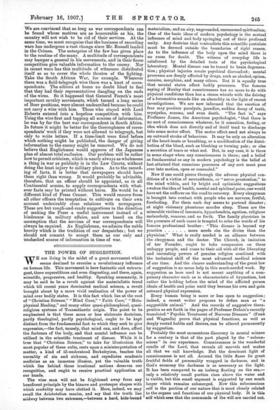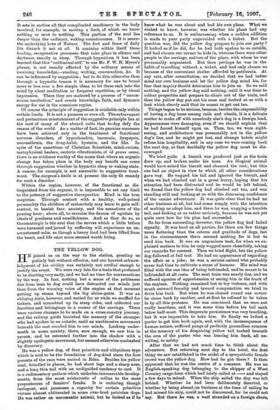• THE POWER OF SUGGESTION.
WE are living in the midst of a great movement which seems destined to exercise a revolutionary influence on human life. This movement is here fantastic and extrava- gant, there superstitious and even disgusting, and there, again, scientific, progressive, and healthy. Speaking summarily, it may be said to be a revolt against the materialistic trend which till recent years dominated medical science, a revolt brought about by a more vivid realisation of the power of mind over bodily states. It is this fact which lies at the root of " Christian Science," "Mind Care," "Faith Cure," "Meta- physical Healing," and many other quasi-philosophical, quasi- religious systems of Transatlantic origin. The point to be emphasised is that these more or less elaborate doctrines, partly theological, partly psychological, ought to be kept distinct from the fundamental fact to which they seek to give expression,—the fact, namely, that mind can, and does, affect the fortunes of the body, and that mental influence can be utilised in the scientific treatment of disease. While it is true that "Christian Science," to take for illustration the most popular of these milts, rests upon a misinterpretation of matter, a kind of ill-understood Berkeleyism, teaches the unreality of sin and sickness, and repudiates academic medicine as an immense illusion, yet the valuable truth which lies behind these irrational notions deserves our recognition, and ought to receive practical application at our bands.
The wise man will- not be frightened away from any beneficent principle by the bizarre and grotesque shapes with which credulity may have clothed it. Here, indeed, we may recall the Aristotelian maxim, and say that the truth lies midway between two extremes,—between a hard, hide-bound
materialism, and an airy, ungrounded, unreasoned spiritualism. One of the basic ideas of modern psychology is the mutual influence of mind and body springing out of their profound unity. Any doctrine that contradicts this scientific postulate must be deemed outside the boundaries of right reason. As to the influence of the body upon the mind there is no room for doubt. The witness of everyday life is reinforced by the detailed tests of the psychological laboratory. Mental disease can be traced to brain degenera- tion; physical injuries create psychical discomfort ; mental processes are deeply affected by drugs, such as alcohol, opium, cocaine, morphine, and many others. But it is equally trite that mental states affect bodily processes. The famous saying of Huxley that consciousness has no more to do with physical conditions than has a steam whistle with the driving of a locomotive sounds like an absurdity in the light of recent investigations. We are now informed that the emotion qf fear may produce paralysis, jaundice, sudden decay of teeth, erysipelas, eczema, and even death. "The fact is," says Professor James, the American psychologist, "that there is no sort of consciousness whatever, be it sensation, feeling, or idea which does not directly and of itself tend to discharge into some motor effect. The motor effect need not always be an outward stroke of behaviour. It may be only an alteration of the heart-beats or breathing, or a modification of the distri- bution of the blood, such as blushing or turning pale; or else a secretion of tears or what not. But, in any case, it is there in some shape when any consciousness is there ; and a belief as fundamental as any in modern psychology is the belief at last attained that conscious processes of any sort must pass over into motion, open or concealed."
Now if one could pierce through the adverse physical con- ditions of a victim of neurasthenia, or "nerve prostration," to the mind within, and by bright and optimistic suggestions awaken the idea of health, mental and spiritual poise, one would have set the sufferer on the road to recovery. Every clergyman is brought into contact with people who are nervous, fretful, foreboding. For them each day seems to portend disaster ; at night visionary phantoms murder sleep. These are the miserable victims of insomnia, hypochondria, egotism, religious melancholy, remorse, and, so forth. The family physician in the presence of such cases is tempted to echo the words of his famous professional brother, "This disease is beyond my
practice more needs she the divine than the physician." What is really needed is an alliance between the clergyman and the doctor. The Church, in imitation of her Founder, ought to take compassion on these unhappy people, and come to their aid with all the liberating and recreating powers of genuine religion combined with the technical skill of the most advanced medical science of our time. And the clearer understanding of the great law of suggestion is no mean help in this much-needed work. By suggestion as here used is not meant anything of a com- pulsory character such as is characteristic of hypnotism, but rather the bolding before the mind of the afflicted person ideals of health and poise' until they become his own and gain outward physical expression.
Every human being is more or less open to suggestion; indeed, a recent writer proposes to define man as "a suggestible animal." And the records of suggestive thera- peutics as set forth in the pages of Professor Dubois's recently translated "Psychic Treatment of Nervous Diseases" (Funk and Wagnalls) prove that physical functions, as well as deeply rooted habits and desires, can be altered permanently by suggestion.
Probably the most momentous discovery in mental science for a century is that of the part played by the " subcon- scious" in our experience. Consciousness is the wonderful candle of the Lord, that reveals all marvels and makes all that we call knowledge. But the dominant light of consciousness is not all. Around the little flame lie great fruitful fields of personality wrapped in darkness, and in God's economy the darkness is as necessary as the light. It has been compared to an iceberg floating on the sea,— only a relatively small portion rises above the water and is visible, but this small segment is supported by one much larger which remains submerged. Now this subconscious self is the portion of our nature that is most closely related to the organs and functions of our physical body. It is this self which sees that the commands of the will are carried out.
It seta in motion all that complicated machinery in the body involved, for example, in moving a limb, of which we know nothing or next to nothing. This portion of the soul lies deeper than the ordinary, waking consciousness. It is nearer the underlying laws of Nature. The fret and fame of daily life disturb it not at all. It contains within itself those healing, recuperative processes that take place in silence and darkness, usually in sleep. Through hypnotism it has been learned that this" subliminal self," to use Mr. P. W. H. Myers's phrase, is not usually affected by the ordinary means of receiving knowledge,—reading, writing, conversation, &O. It can be influenced by suggestion ; but to do this otherwise than through a hypnotic trance it is necessary for one to brood more or less over a few simple ideas, to let these sink into the mind by silent meditation or frequent repetition, or by visual impression. There they are matured by a process of "uncon- scious incubation," and create knowledge, faith, and dynamic energy for use in the conscious region.
Of course the principle of suggestion is available only within certain limits. It is not a panacea or cure-all. The extravagant and pretentious misstatement of the suggestive principle lies at the root of many of the absurd cults that to-day defy the reason of the world. As a matter of fact, its genuine successes have been achieved only in the treatment of functional nervous disorders, of hypochondria, insomnia, dyspepsia, neurasthenia, the drug-habit, hysteria, and the like. In spite of the assertions of Christian Scientists, mind-curists, metaphysical healers, esoteric vibrationists, et in genes (mom, there is no evidence worthy of the name that where an organic change has taken place in the body any benefit can come through suggestion whether in hypnotic sleep or waking state. A cancer, for example, is not amenable to suggestive treat- ment. The surgeon's knife is at present the only fit remedy for such a disorder.
Within the region, however, of the functional as dis- tinguished from the organic, it is impossible to set any limit to the potency of suggestive therapeutics. Mind is the true magician. Through contact with a healthy, well-poised personality the children of melancholy may learn to gain self- control, to banish fear, anxiety, and the sensations of the passing hour ; above all, to exorcise the demon of egotism by ideals of goodness and unselfishness. And as they do so, so thaumaturgic is the soul that the nerves which a little before were-harassed and jarred by suffering will experience an un- accustomed calm, as though a heavy load had been lifted from the heart, and life once more seemed worth living.







































 Previous page
Previous page